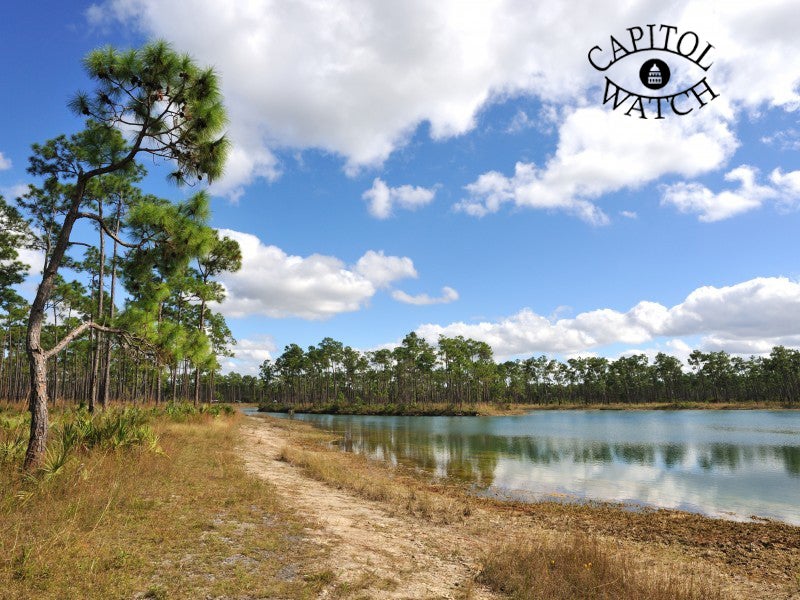The Everglades Under Fire
Florida is taking advantage of the new political environment to try and weasel out of its legal commitment to clean up Everglades National Park.

This page was published 8 years ago. Find the latest on Earthjustice’s work.
A good news update: On Feb. 11, 2019, federal Judge Federico Moreno ruled from the bench, rejecting the request to let Florida out of the historic legal agreement the state made to clean up the Everglades National Park. “The ruling is a victory for the Everglades,” said Alisa Coe, the Tallahassee-based Earthjustice attorney who serves as legal counsel for the environmental organizations that intervened. “The job of cleaning up the Everglades is not done.” The ruling means that important protections for the Everglades will continue. Earthjustice represented the Florida Wildlife Federation, National Wildlife Federation, Sierra Club, National Parks Conservation Association, Defenders of Wildlife, and Audubon Society of the Everglades.
Original post from Mar. 3, 2017: President Trump’s efforts to “drain the swamp” should not include shafting Everglades National Park. Shortly after the president’s nominee, Jeff Sessions, was confirmed as U.S. attorney general, officials at the South Florida Water Management District swiftly—and quietly—contacted the Department of Justice, which Sessions oversees. Why? The water managers are trying to weasel out of a commitment Florida made to the department nearly 25 years ago to clean up water pollution in the Everglades.
This political maneuvering to weaken legal protections for Everglades National Park is out of line with the values of Americans, who want clean water–now and for future generations. It’s part and parcel of the new political environment, in which some state leaders—long determined to slash environmental protections—are seizing their chance with the help of a polluter-friendly administration.
Everglades National Park is one of America’s great places. The vast, pale green South Florida marsh is the largest continuous stand of sawgrass prairie left in North America. It is the continent’s most significant tropical bird breeding ground and contains the largest mangrove ecosystem in the Western Hemisphere. The Everglades also recharges the Biscayne aquifer, which provides most of South Florida’s drinking water.
Climate change, development and industrial agriculture have weakened America’s great marsh for decades.
Back in 1988, the federal government sued Florida because the state was harming the park by allowing in too much dirty runoff from industrial agriculture (especially sugar cane operations). Earthjustice entered the case on behalf of several conservation groups, including the National Wildlife Federation, the National Parks Conservation Association and the Audubon Society of the Everglades.
The state fought the federal suit tooth and nail until 1991. Then, in a surprise move, newly elected Governor Lawton Chiles came to a Miami court hearing and said the state wanted to clean up the Everglades’ water and settle with the feds. “We want to surrender,” he said. “I want to find out who I can give my sword to.” The state signed a consent decree committing to clean the polluted water, and since then, Earthjustice has fought to ensure the decree is properly implemented.
Over three decades, we’ve had to go to court to enforce the legally required cleanup efforts because the state has repeatedly sided with powerful corporate polluters (and prodigious campaign contributors), including the sugar industry. Although the state has done work to repair the Everglades, the job is far from over.
Now that Jeff Sessions has been confirmed as attorney general, Florida is trying to renege on its promise. This is unacceptable. Polluted water is still harming the Everglades—and the consent decree is our legal tool to make sure the important environmental restoration work is finished.
Without the court supervision that the consent decree provides, Everglades National Park—and all of us who want to protect it—will be at the mercy of polluter-friendly politicians who put short-term profits over environmental protection. Earthjustice will fight on to keep the consent decree in place and keep the unique Everglades ecosystem healthy.
The Florida regional office wields the power of the law to protect our waterways and biodiversity, promote a just and reliable transition to clean energy, and defend communities disproportionately burdened by pollution.
Established in 1989, Earthjustice's Policy & Legislation team works with champions in Congress to craft legislation that supports and extends our legal gains.